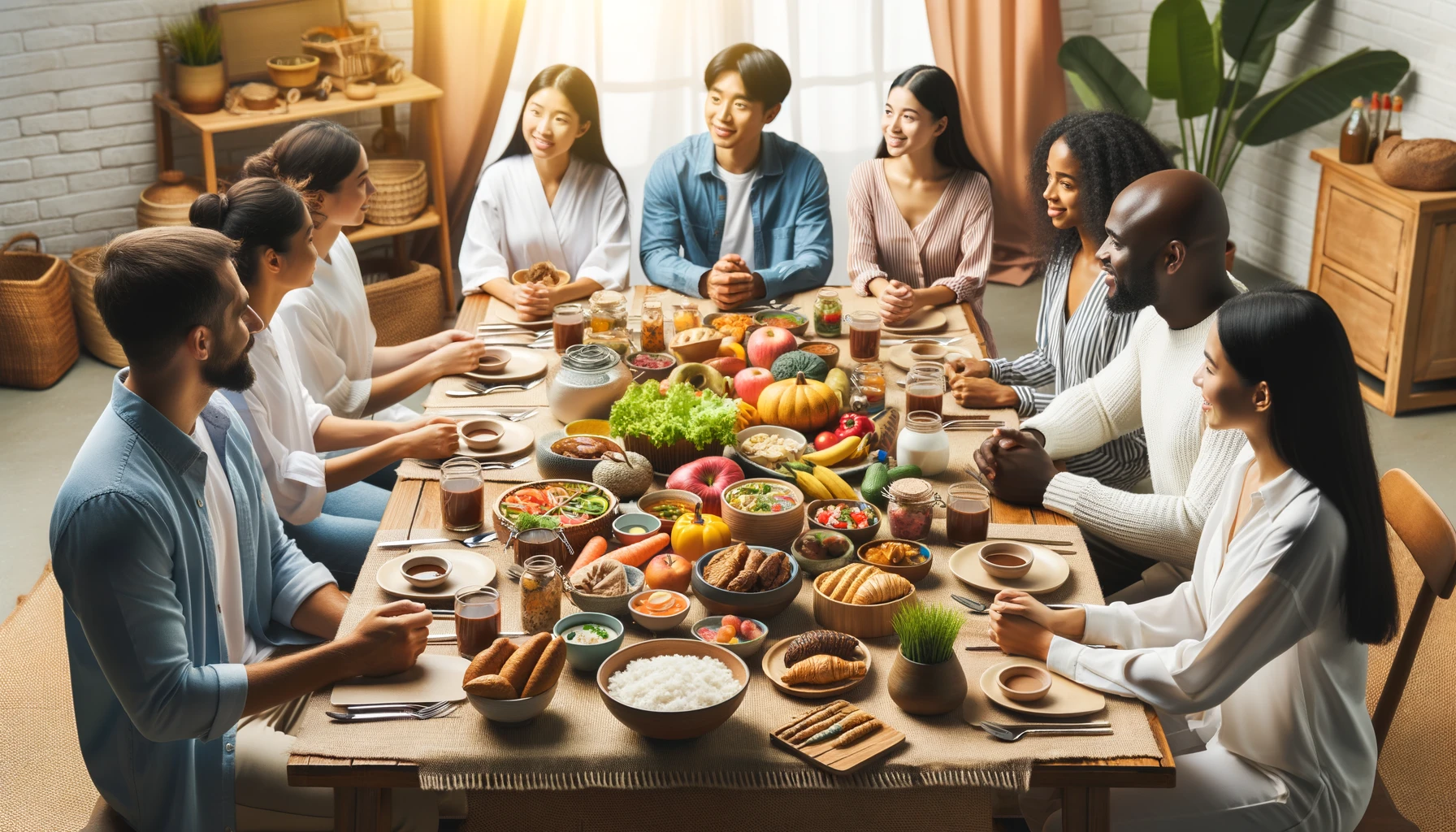Greetings, dear readers! Today, I invite you to embark on a thought-provoking journey exploring the realm of controversial opinions surrounding healthy eating. In this article, we will unravel the various viewpoints that challenge the widely accepted beliefs and values associated with maintaining a nutritious lifestyle.
Controversial opinions on healthy eating have the power to ignite passionate debates, encouraging us to question the norms and delve deeper into our understanding of nutrition. These opinions dare to question the health benefits of certain foods and challenge the significance of specific dietary guidelines. They even propose alternative approaches to nourishment that deviate from the conventional wisdom.
While these opinions may sometimes divide us, they also offer a remarkable opportunity for self-reflection and the examination of long-established beliefs. By exploring and scrutinizing these controversies, we can gain fresh insights and foster a more inclusive dialogue surrounding healthy eating.
So, join me as we uncover the intriguing disparities and thought-provoking debates that surround healthy eating. Together, let us challenge our preconceptions, broaden our perspectives, and embark on a journey towards a more holistic understanding of nutrition.
The Impact of Fast Food on Public Health

Fast food has become ubiquitous in our modern society, offering quick and convenient meals that cater to our busy lifestyles. However, the rise of fast food consumption has also brought about a myriad of concerns regarding its impact on public health. Research has consistently linked fast food to the rise in obesity rates and the development of chronic diseases such as heart disease, diabetes, and hypertension.
What sets fast food apart from traditional homemade meals is its high caloric content, excessive amounts of unhealthy fats, sugars, and sodium. These ingredients are not only detrimental to our physical health but can also lead to unhealthy eating habits. The addictive nature of fast food, combined with aggressive marketing tactics, creates a cycle of dependency that is difficult to break.
I believe it is crucial to raise awareness about the negative consequences of fast food consumption on our health. By educating individuals and communities about the risks associated with excessive fast food intake, we can empower them to make healthier choices and adopt more balanced eating habits.
Moreover, the fast food industry’s practices have come under scrutiny, with similarities being drawn between their marketing strategies and those employed by the tobacco industry. This has raised concerns about the industry’s influence on public opinion and legislation, as well as issues related to animal welfare and worker exploitation.
| Impact of Fast Food on Public Health | Statistics |
|---|---|
| Obesity rates | Continuously increasing |
| Chronic diseases (heart disease, diabetes, hypertension) | Higher prevalence among fast food consumers |
| Unhealthy eating habits | Fast food addiction and overconsumption |
To combat these issues, some fast food brands have started introducing healthier menu options and emphasizing their commitment to addressing public health problems. While these efforts are commendable, it is essential for consumers to exercise critical thinking and make informed choices when it comes to their food consumption.
In conclusion, the impact of fast food on public health cannot be ignored. It is imperative that we recognize the detrimental effects of excessive fast food consumption, both on an individual and societal level. By promoting education and fostering a culture of mindful eating, we can work towards mitigating the negative consequences of fast food and building a healthier future for ourselves and future generations.
The Influence of Social Media on Healthy Eating Perceptions
Social media platforms have revolutionized the way we consume and share information, and this extends to our perceptions of healthy eating. With the rise of platforms like TikTok and Instagram, individuals now have access to a vast array of opinions, recommendations, and advice related to nutrition and wellness. While this can be empowering, it also raises questions about the credibility and influence of the information shared on social media.
Influencers play a significant role in shaping healthy eating perceptions on social media. These individuals, often without scientific evidence or professional expertise, promote certain dietary trends, food products, and lifestyles to their followers. While some influencers provide valuable and accurate information, others may perpetuate misinformation or promote unhealthy habits. This has led to debates on the reliability and trustworthiness of social media influencers as sources of nutritional information.
Furthermore, companies are capitalizing on the popularity of social media by using it as a marketing tool to target specific audiences. Many brands are partnering with influencers to promote their products, which can further blur the line between genuine recommendations and sponsored content. This influencer culture on social media has both positive and negative effects on healthy eating perceptions, as it can inspire and educate individuals, but also potentially mislead or confuse them.
| Influence of Social Media on Healthy Eating Perceptions | Effects |
|---|---|
| Wide range of opinions, recommendations, and advice available | Empowering individuals, providing diverse perspectives |
| Influencers shaping healthy eating trends | May perpetuate misinformation or promote unhealthy habits |
| Companies using social media as a marketing tool | Blurring the line between genuine recommendations and sponsored content |
The Importance of Critical Thinking
In the age of social media, it is essential for individuals to approach information related to healthy eating with a critical mindset. Evaluating the credibility of sources, fact-checking claims, and consulting professionals can help navigate the sea of conflicting opinions. By empowering ourselves with knowledge and making informed decisions, we can avoid falling prey to misleading information and trends.
It is also crucial for social media platforms and influencers to take responsibility for the content they share. Encouraging transparency, promoting evidence-based information, and fostering open discussions can contribute to a more informed and balanced online community. Ultimately, healthy eating perceptions are a complex interplay of individual beliefs, social influences, and the information we consume. By staying mindful and discerning, we can shape our own perceptions and make choices that align with our personal values and well-being.
The Role of Personal Beliefs in Healthy Eating Choices
When it comes to making healthy eating choices, personal beliefs and cultural influences play a significant role. Our beliefs about food and nutrition are shaped by a variety of factors, including our upbringing, values, and the communities we are a part of.
Food preferences also influence our dietary choices. Some individuals may prefer plant-based diets for ethical or environmental reasons, while others may prioritize organic and locally sourced food for health and sustainability. These personal beliefs and preferences can lead to varying opinions and practices surrounding healthy eating.
Cultural influences further contribute to the diversity of healthy eating choices. Different cultures have their own traditional foods and dietary practices, often rooted in history, religion, and social customs. These cultural influences shape our perceptions of what constitutes a healthy diet and can lead to debates and controversies when different cultural practices clash.
The Impact of Cultural Influences on Dietary Choices
Cultural influences on dietary choices can be seen in our food rituals, celebrations, and customs. For example, in some cultures, certain foods are considered sacred or symbolic and are incorporated into religious ceremonies or festivals. These cultural practices can have a profound effect on our relationship with food and our understanding of what is considered healthy.
It is important to recognize and respect the role of personal beliefs and cultural influences when discussing healthy eating. Engaging in open and respectful dialogue can lead to a better understanding of different perspectives and promote inclusivity in our approach to nutrition and wellness.
| Cultural Influence | Food Preference |
|---|---|
| Indian | Vegetarianism |
| Mediterranean | Emphasis on fruits, vegetables, and olive oil |
| Japanese | Focus on fish, rice, and vegetables |
| Mexican | Use of corn, beans, and chili peppers |
Table: Cultural Influences on Food Preferences
As shown in the table above, different cultures have distinct food preferences that have been shaped by historical, geographical, and cultural factors. These preferences reflect a wide range of beliefs and traditions, highlighting the importance of cultural influences in shaping healthy eating choices.

Conclusion
In a world filled with controversy and differing opinions, the topic of healthy eating is no exception. Public perceptions surrounding this subject have sparked debates and discussions, challenging established norms and beliefs. Controversial opinions on healthy eating offer us an opportunity to question and examine existing practices, fostering a deeper understanding of nutrition and wellness.
The impact of fast food on public health has become a major concern in recent years. The rise in obesity rates and chronic diseases can be attributed, in part, to unhealthy eating habits associated with fast food consumption. The tactics used by the fast food industry, reminiscent of those employed by the tobacco industry, have raised questions about the influence they hold over consumer choices and legislation. Nevertheless, some fast food brands are taking steps to address these concerns by introducing healthier menu options and emphasizing their commitment to public health.
Social media has also played a significant role in shaping public perceptions of healthy eating. Influencers on platforms like TikTok have become powerful voices in promoting dietary trends and food products. While this can be beneficial, it has also raised concerns about the credibility of information shared and the influence it has on individuals’ dietary choices. Additionally, personal beliefs and cultural influences play a crucial role in shaping our individual approaches to healthy eating. Debates on the ethics of consuming animal products, the benefits of organic food, and the role of processed foods are just a few examples of the diverse opinions that exist in this arena.
By acknowledging and addressing these controversies surrounding healthy eating, we can foster dialogue, promote understanding, and ultimately work towards a more balanced and inclusive approach to nutrition and wellness. It is through open-mindedness and an ongoing examination of public perceptions that we can reshape the future of healthy eating for the better.
FAQ
What are some controversial opinions on healthy eating?
Controversial opinions on healthy eating include questioning the health benefits of certain foods, challenging the importance of specific dietary guidelines, and exploring alternative approaches to nutrition.
How does fast food impact public health?
Fast food has been linked to unhealthy eating habits, increasing rates of obesity, and chronic diseases. It raises concerns about animal welfare and worker exploitation. Some fast food brands are addressing these controversies by introducing healthier menu options and promoting their commitment to public health.
How does social media influence healthy eating perceptions?
Social media platforms like TikTok play a significant role in shaping public perceptions of healthy eating. Influencers promote certain dietary trends and products without scientific evidence or professional expertise, leading to debates on credibility and influencing individual dietary choices.
What role do personal beliefs play in healthy eating choices?
Personal beliefs and cultural influences significantly shape individuals’ choices regarding healthy eating. Controversial opinions include debates on consuming animal products, the benefits of organic and locally sourced food, and the role of processed foods in a healthy diet.
How can exploring controversial opinions promote a more balanced approach to healthy eating?
Exploring controversial opinions allows for challenging existing beliefs, engaging in meaningful discussions, and promoting a deeper understanding of public perceptions. By acknowledging and addressing controversies, we can work towards creating a healthier, more inclusive approach to nutrition and wellness.

God, you’re incredible! I can’t recall ever reading anything like it. What a relief to discover someone who has fresh ideas about this. Your initiative in launching this is truly appreciated. Someone with some creativity is really required on the web, and this website provides that.